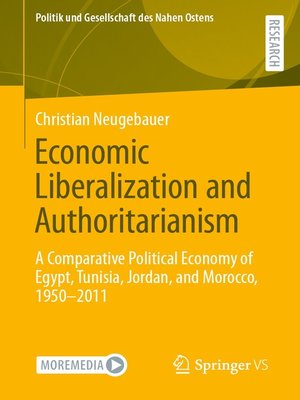Economic Liberalization and Authoritarianism
ebook ∣ A Comparative Political Economy of Egypt, Tunisia, Jordan, and Morocco, 1950-2011 · Politik und Gesellschaft des Nahen Ostens
By Christian Neugebauer

Sign up to save your library
With an OverDrive account, you can save your favorite libraries for at-a-glance information about availability. Find out more about OverDrive accounts.
Find this title in Libby, the library reading app by OverDrive.



Search for a digital library with this title
Title found at these libraries:
| Library Name | Distance |
|---|---|
| Loading... |
Contrary to other world regions, political regimes in the Middle East and North Africa (MENA) remain largely authoritarian. While the search for explanations is still ongoing, Christian Neugebauer draws attention to a hitherto underresearched factor: economic liberalization. Being part of a global shift from state-led development towards structural adjustment in the economy, these policies also deeply affected the countries of the MENA region. This makes the resilience of authoritarianism in the region all the more puzzling, as a large part of the scientific community expected economic liberalization to undermine authoritarian regimes. Neugebauer strives to solve the puzzle with a comparative case study that covers four countries (Egypt, Tunisia, Jordan, and Morocco) and their political regimes, from independence in the 1950s to the Arab Spring in 2011. He shows that two specific policies of economic liberalization might in fact have been relevant for regime stability: consumer-price liberalization and privatization.







